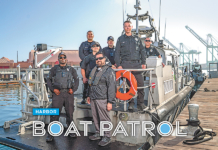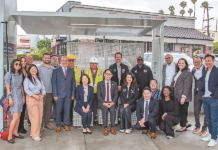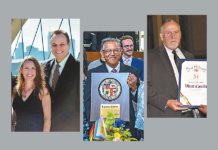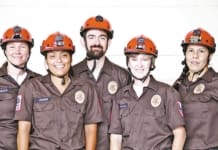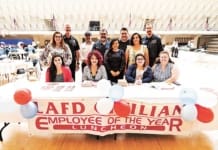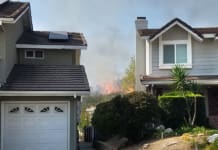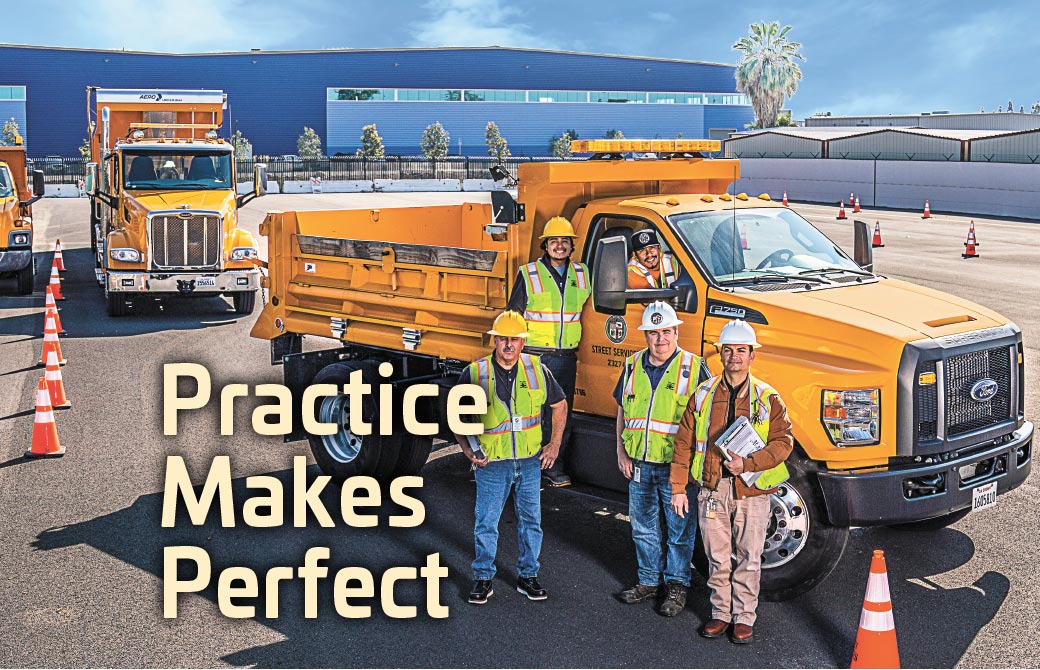
Photos by Summy Lam, Club Chief Operating Officer,
and courtesy Public Works/Street Services
W
hen it comes to driver safety, there’s no substitute for classroom learning, time in a challenging simulator, and experience behind the wheel.
That’s the thinking behind StreetsLA’s Commercial Vehicle Training Center, its comprehensive driving academy and partial licensing center in Van Nuys. The state DMV has authorized the center to test City-employed truck drivers on a DMV-approved course on City property. (The written and medical portions of the licensing process must still be performed by the DMV.)
The center also trains operators to use heavy equipment like loaders that do not involve general on-road driving.
The Commercial Vehicle Training Center was reformed three years ago to address the gaps and opportunities in the program and reduce liability against the City.
Come along with the Alive! team as we learn all about the center’s new capabilities and climb inside its impressive simulator for a test drive.


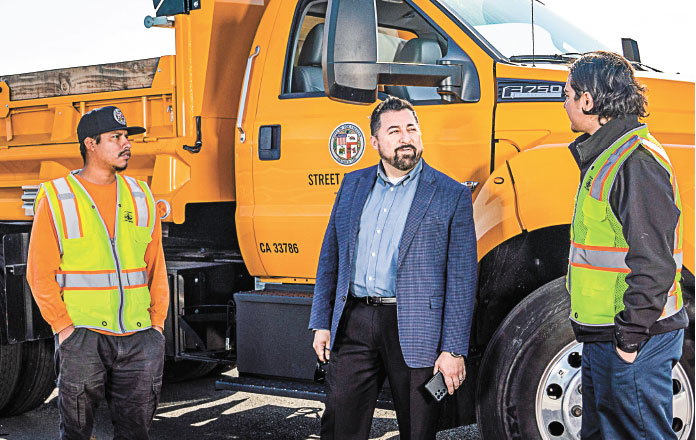
It’s All About Safety
On Feb. 27, Club CEO Robert Larios and Alive! editor John Burnes interviewed Jerry Wolfe, Safety Engineer, 2 years of City service, Club Member; and Leonel Chacón, Street Services Supervisor II, 22 years, Club Member, of Streets/LA’s Risk Management and Safety Section. The subject: StreetsLA’s relatively new Commercial Vehicle Training Center, which trains and certifies Street Services drivers to operate heavy equipment. The interview took place via the Club’s Zoom link. ¶ Both Jerry and Leo are Club Members.
Thanks for joining us today. Let’s start with this: How did you get to the position that you’re in? What was your path?

Leonel Chacón: I was asked by the Bureau Director to help out with the Commercial Vehicle Training Section. It has to do with my institutional knowledge of working with commercial vehicles for more than 15 years. I’ve worked with everyone from our Class A (big rig licensed) drivers down to our oversized equipment operators.
What is meant by “commercial”?
Leonel: For the Bureau, that means a license for either Class A or Class B vehicles that haul equipment and other items.
So you deal only with City employees who are learning to drive vehicles that the state DMV calls commercial vehicles.
Leonel: Yes.
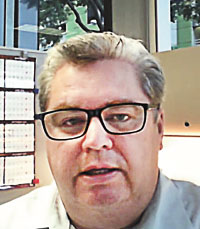
Jerry Wolfe: Specifically with Bureau employees, not all City employees.
Leonel: Exactly, Bureau of Street Services only.
Jerry: The commercial vehicles used in our Bureau are those designed for transporting heavy equipment and other materials. Most people have a Class C license. If you move up in weight of a vehicle, then that next step would be a commercial B license, and if you were to add the weight plus a trailer, then that takes it into a Commercial A. We train and test StreetsLA operators who drive the heavier equipment out there on the road.
Jerry, you’re a recent hire by the City. What path did you take to your position?
Jerry: I applied for the position, was interviewed and selected for the position. I have my Bachelor’s and Master’s degrees in environmental occupational health and safety.
In the early ’90s when I started my professional career, I was working for private companies. Then I went into the public sector in the LA County Sanitation Districts, the City of Long Beach, then Huntington Beach as the City Safety Officer. I re-entered the private sector for the Ingersoll Rand companies Hussmann and Trace Commercial Services. I came back to the public sector a little more than two years ago here at Street Services.
I was a regional leader in the private sector and city safety officer in Huntington Beach, so I’ve been in various levels of leadership. I bring knowledge, background experience and education to help all the managers and supervisors in our bureau better protect the employees and take care of them.
– INTERVIEW CONTINUES BELOW
| CERTIFICATION COURSE |
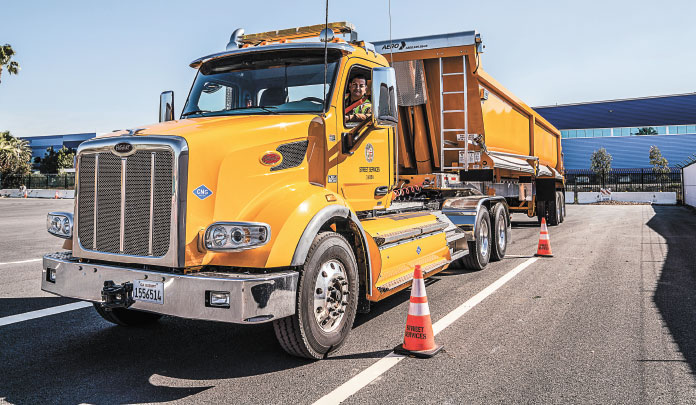 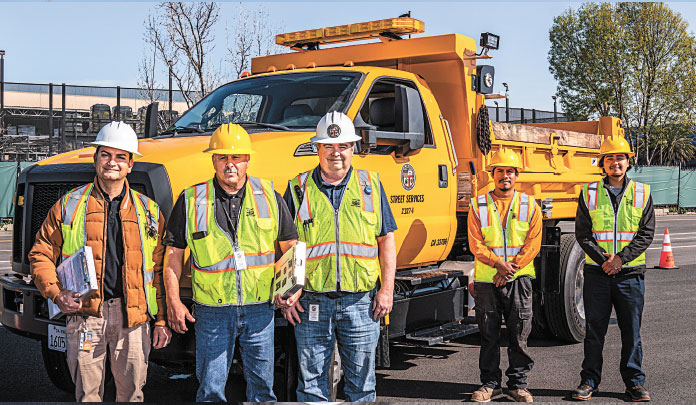 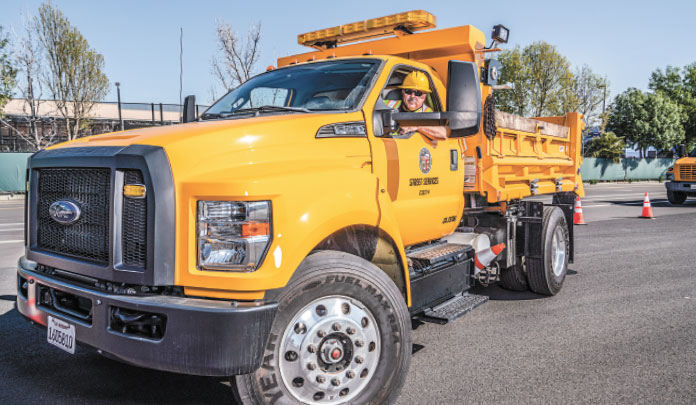 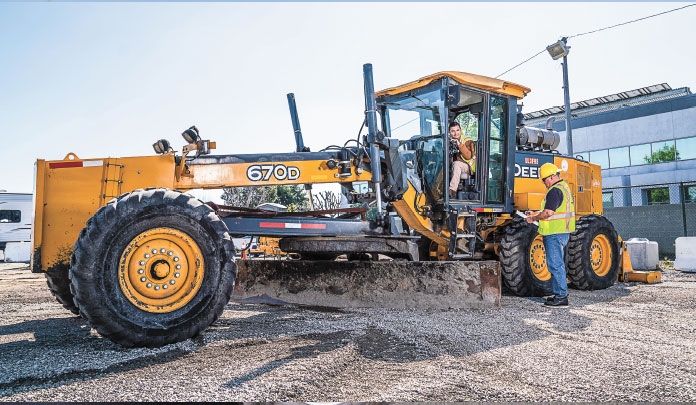 |
 Training and Testing
Training and Testing
What’s the purpose of the Commercial Vehicle Training Center, and who is it for?
Jerry: There are two sides to it – the commercial vehicle side trains and tests drivers on getting Commercial A and B licenses. The other side is to train operators on using heavy equipment, such as loaders, backhoes, paving machines and other equipment.
Leonel: The main purpose is to help the Bureau reduce liability. The focus is to bring the Bureau to a certain standard when it comes to commercial-license drivers and understand what is obligated either by law or by bureau policy when it comes to checking your vehicle and making sure it’s safe to go out on the road.
Jerry: Leo was here when they restarted this unit about three years ago. There are liability claims against the City due to damage made by our vehicles and equipment; that’s the reality of it. To reduce liability, decrease severity of accidents and reduce the number of accidents that we have both for heavy equipment and the commercial vehicles – these were the compelling reasons to restart the Commercial Vehicle Training Section. It’s to make sure that we’re addressing the gaps and the opportunities that we have to correct. That is what this group has been doing for the past three years – working to be proactive instead of reactive.
The Section has taken it further – Leo and Joseph Castorena have now been certified by the California DMV to test the skills portion of a Commercial B or a Commercial A license candidate. The DMV certified our test area at Balboa Yard and approved driving routes that must include the proper maneuvers. [The written and medical portions still must be administered by the DMV.] This ability to serve as proxy DMV examiners benefits the Bureau because it reduces the time it takes to have drivers schedule an exam for the DMV commercial skills and driving tests. There’s a time limit element– if an employee was hired for a position that required at least a Commercial B license, and there was a waiting list for their test to be performed by the DMV, they might run out of time waiting on availability with the DMV. Leo and Joseph are certified to give the skills and driving tests. The Bureau loses fewer drivers that way.
Got it. Both of those – the training and the testing – make sense for the City.
Jerry: We are the Risk Management and Safety Section. We are trying to reduce the risk and liability within the Bureau.
Leonel: We’re here to make everyone aware of safety. “Don’t do this. Don’t do that. Why? Because of this, because of that.” That’s why we’re here, to remind everybody of the importance of safety. Working around equipment or driving a truck down the road, it’s all about safety, safety, safety, safety.
Jerry: We tell them to take care of themselves, take care of each other and to take care of the other people who share the road with them.
– INTERVIEW CONTINUES BELOW
| DRIVING SIMULATOR |
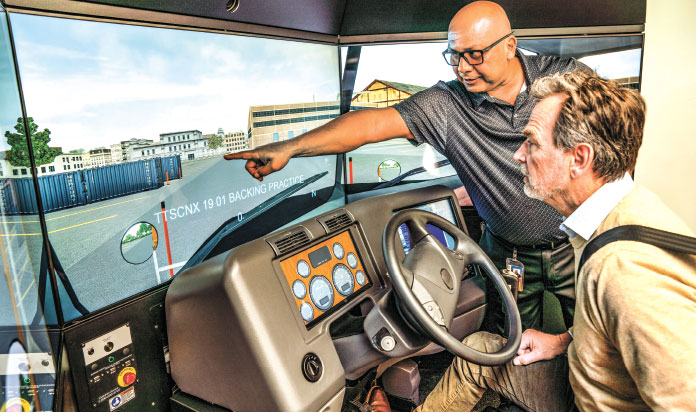 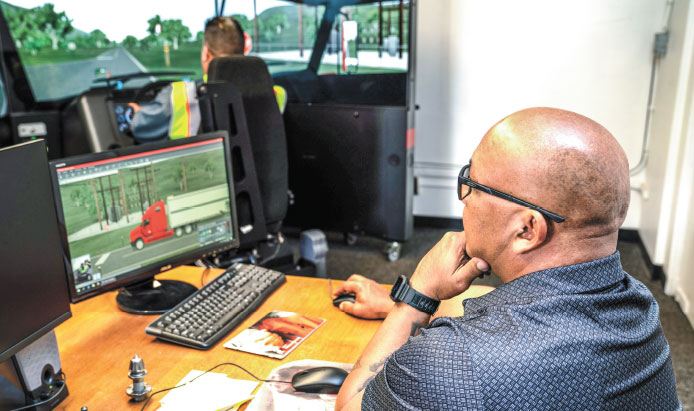 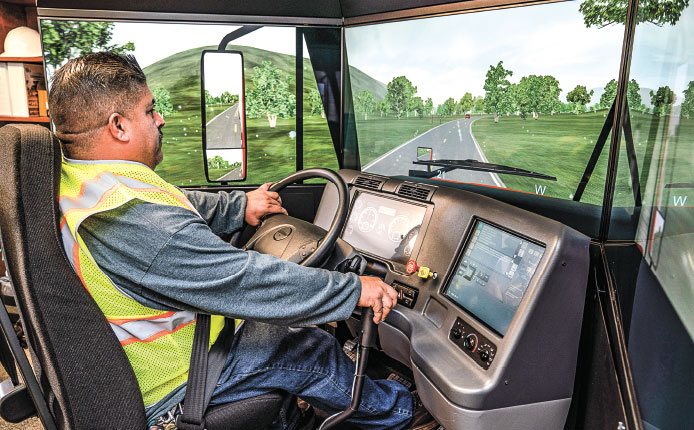 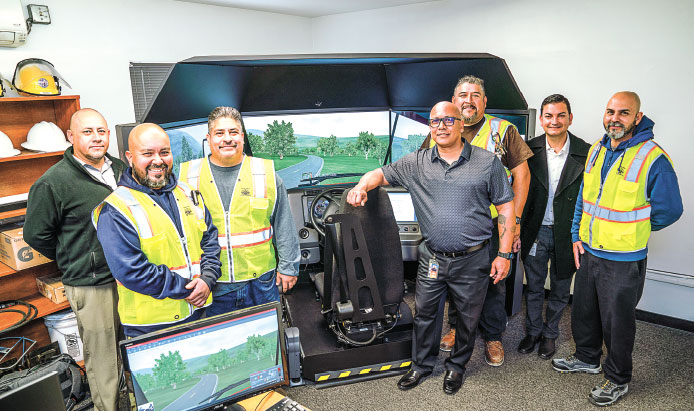 |
 History
History
What’s the history of the Center?
Leonel: Back in the early 2000s there was a commercial vehicle section of the Bureau. But there were fiscal challenges that led to a ten-year freeze in the City. The realization of increased liabilities led to restarting the Section: to bring down the losses.
As part of that process we were certified by the DMV to issue Commercial A and B licenses.
Jerry: That’s the commercial vehicle side. On the heavy equipment side – we saw opportunities to enhance the core competencies, proficiency and the skills that employees have when they’re dealing with the heavy equipment – the loaders, backhoes etc. The heavy equipment training also takes place in the Balboa Yard.
Both sides have safety as a goal.
Jerry: Safety is a value. Operational safety both for the operator and those who are on the ground in the worksites as well is a never changing value.
We’re doing what is required by normal occupational health and safety standards to protect the Bureau employees.
As Leo touched upon, it’s important to help employees build careers, too. Some Bureau employees have the opportunity to be promoted, and because of the training and licensing here, there have been some employees who have the opportunity to see their wages increase because they learned new skills or passed their commercial license tests. It’s a great feeling to see someone go through the training and their lives change because of getting their Commercial B license.
That’s an important point. Give us a quick list of the kinds of vehicles and heavy equipment you train on.
Leonel: We train on several pieces of equipment: Class B tractors and dump trucks; Class A tractors and trailers; graders, motor graders, front loaders, backhoes, pavers, profilers, and others.
Is there a course of study that your drivers and operators must complete? A syllabus?
Jerry: That is still in development. We’re going through incremental improvement, one step at a time, one piece of equipment at a time. Essentially, our employee should already know how to operate equipment they were hired for, but there are operational issues that need to be addressed.
How does the training program take for someone to go through?
Leonel: If employees are going for either the B or A, four days. Three of those days are basically the DMV content. We are required to teach the individuals the DMV course as part of the process, so three days of that content. The fourth day is testing day.
Jerry: Leo is describing the ETP, the Employee Testing Program; this is the program through which we are certified by the DMV to conduct the commercial license tests. One of the requirements of having an Employee Testing Program is that we have our own curriculum. What Leo and Joseph do is present the Street Services way of inspecting and operating vehicles – the brake test, tires, cabin, vehicle inspection, and then take them through the DMV test. As examiners Leo and Joseph cannot both train and test an employee test candidate on driving skills. One will train and the other will conduct the testing
Referring now to the heavy equipment side – not the ETP – we also teach skills. It’s left, right, up and down, how to operate the equipment, how to stage the equipment, how to transport the equipment, how to secure it, and so forth. It’s about presenting the least risks and hazards to the commuting and pedestrian public that we can. And situational awareness – we can’t normally block bike lanes and we always need to set up the proper barricades when we are loading and unloading equipment.
It’s comprehensive.
Leonel: Yes it is. It’s an intense course that we offer.
Jerry: And we can’t forget about the simulator over at Plant II.
Yes – tell us about that.
Leonel: Training is available on the driving simulator. We can simulate anything. Part of the training includes our operators experiencing what it feels like to drive in rain or fog and what it feels when your back brakes fail. They get to feel that in the simulator.
Jerry: There are many scenarios that the software allows us to simulate inside this rig with multi screens and truck cabin interior mock up.
Impressive! Does the curriculum include refresher courses for employees in case the equipment changes, and so forth?
Leonel: Yes, we offer some refresher courses if the equipment or operator responsibilities might change. We’ll give them a refresher training course here at the yard.
Jerry: Leo brings up a good point – within our Bureau, for an employee to operate a piece of heavy equipment one has to have at least a Class B license, and sometimes a Class A. I’m talking about more than just the tractor-trailers. I mean the rollers, the profilers, the backhoes, the front-end loaders, etc. Street Services requires that you at least have that Class B and sometimes a Class A to operate heavy equipment.
– INTERVIEW CONTINUES BELOW
| CLASSROOM TRAINING |
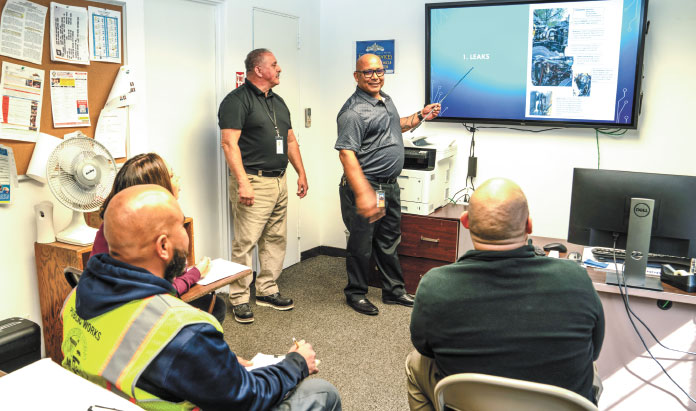 |
 Life-Changing
Life-Changing
You mentioned before how much these two programs can assist young employees in building their career. Can you talk a little more about that?
Leonel: Yes, because it actually brings chills up my spine to see the gratitude of these employees who have come to our training section and have their lives changed, from making $40,000 to making six digits. I get phone calls and visits from people who stop by, just thankful for how we were able to help them further their career.
Jerry: There are two programs that I know of; Targeted Local Hire program, the TLH program and Bridge program that helps people enter into City employment not necessarily through civil service, but through this TLH program. I don’t know if I’m doing the explanation justice, but TLH hires will work either in the office or in the field. There have been occasions where TLH employees go through the Section testing and pass their Commercial B license test. They can increase their earnings potential because of the additional pay that comes with having that license.
Leonel: Because they qualify for the higher position.
Jerry: It opens up the door for advancement.
Leonel: I tell employees, “You can go as far as you want here. It’s really up to you.” We’re the tool that they can use us to get where they want to get. It’s up to them.
Jerry: It really is incumbent upon the person to take advantage of the opportunity and put in the time and effort to do it. The opportunity is there, but the person must decide to go through what it’s going to take to get them through it and learn skills outside of a comfort range. It’s not easy. So far I think nearly 50 employees have taken this route. They all didn’t pass right away. They might have to reflect on their skills and practice more, and then come back and retest.
Nothing here is gifted. It’s earned.
– INTERVIEW CONTINUES BELOW
| MORE TRAINING PROGRAMS |
| StreetsLA’s Commercial Vehicle Training Center isn’t the only path toward safer drivers. Street Maintenance Technology Program
The City also sponsors the Street Maintenance Technology Program, which provides the necessary technical knowledge and skill to Street Services employee who wish to advance to Supervisor and Superintendent levels. The courses are also open to other City employees and outside city agencies and the public. The program is an upward mobility opportunity that offers a thorough knowledge of paving, resurfacing and repairing of Los Angeles’ city streets and roadways. The technology program began in the early 1970s and was reinstituted in its current form in 1991. It offers specialized courses that allow bureau employees to either focus on a specific area that will enhance their job skills such as Heavy Equipment or Report Writing, or pursue a Certificate or Associates degree in the program co-hosted through the Los Angeles Community College District. Motor Sweeper Operations school 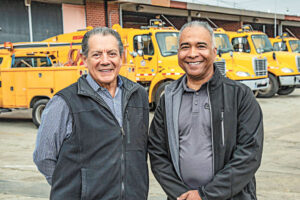 Part of the overall technology program is the Motor Sweeper Operations school, which teaches the student drivers to master the safe operational procedures and maintenance practices of Motor Sweeper Operators. The Motor Sweeper School began 38 years ago and was implemented by then-Training Superintendent Abraham Navarro. 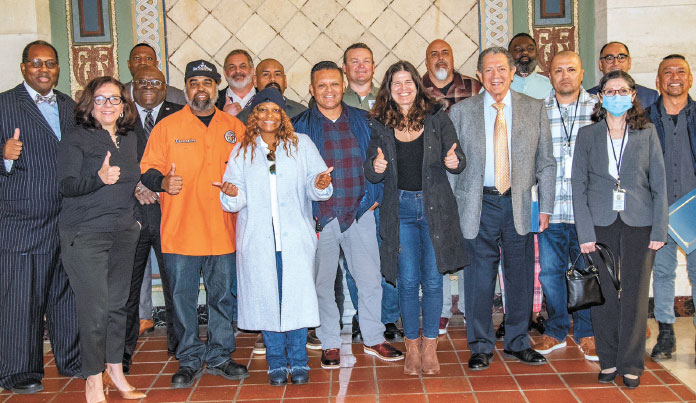 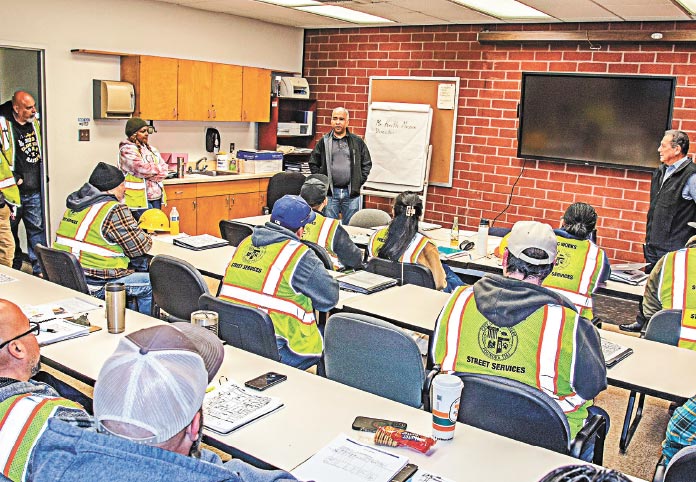 |
 Challenges
Challenges
What main challenges does the center face these days?
Leonel: Staffing. There’s just not enough of Joseph or me to go around, so to speak. But we’re just starting and we’ll see what happens with the budget next year and see where we are. I have a list of individuals who want to get their Bs, but there’s only so much I can do with all my other responsibilities in the bureau.
Right.
Jerry: The need outpaces the bandwidth that Leo and Joseph have. Eventually, the employees who may become part of the Section to assist with training have to have the heart and the mind to help others learn. Someone who wants to be an instructor needs to know about adult learning; how to transfer knowledge in a way that people can grasp. Are they a visual learner? Do they book lessons? Are we able to transfer that information and knowledge into a way that somebody can learn how to actually do it? With instructors we look at their ability to connect with employees.
 A Calling
A Calling
What do you love about what you do?
Leonel: I’m able to help somebody and improve their livelihood in all aspects of their life. There are no words to describe that feeling when you see somebody who has accomplished something and they’re able to live a more comfortable and a little bit less worried life. I love that.
Jerry: I absolutely feel that the Lord has put me here to help out and to make a difference and to help leadership, supervision and employees work better and protect themselves and make a better life for themselves. I absolutely believe that.
Leo and Jerry, thanks for speaking to us today.
Jerry: You’re welcome.
Leonel: You’re welcome.
Jerry: Take care. n



